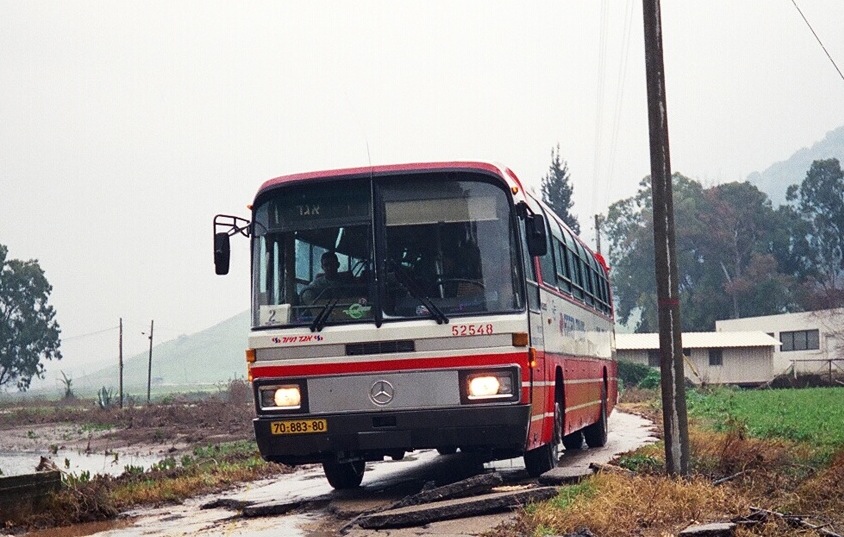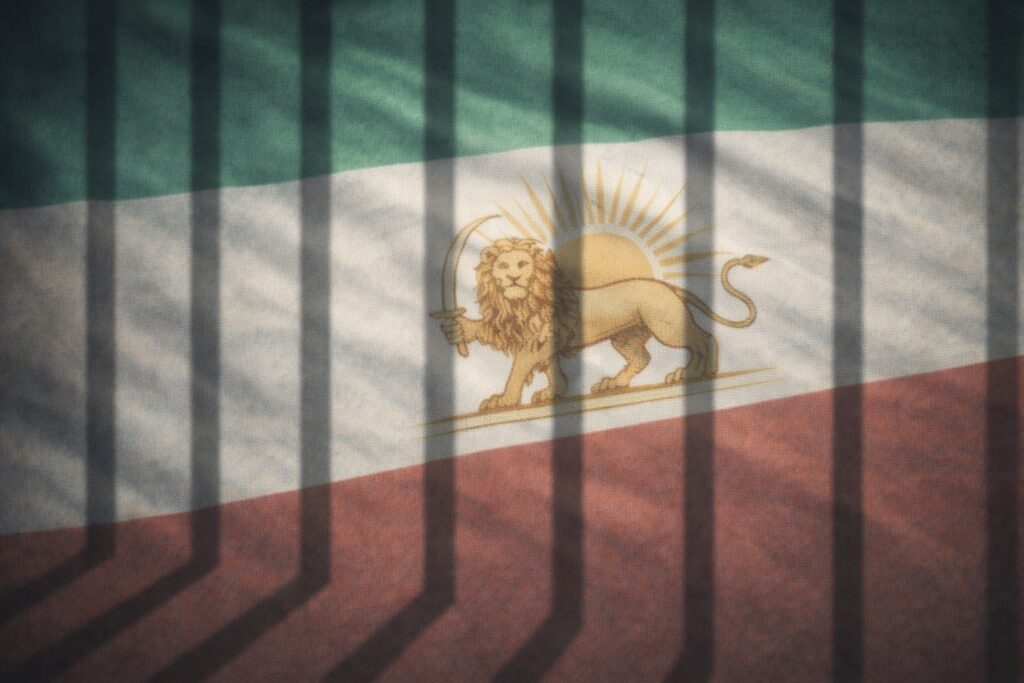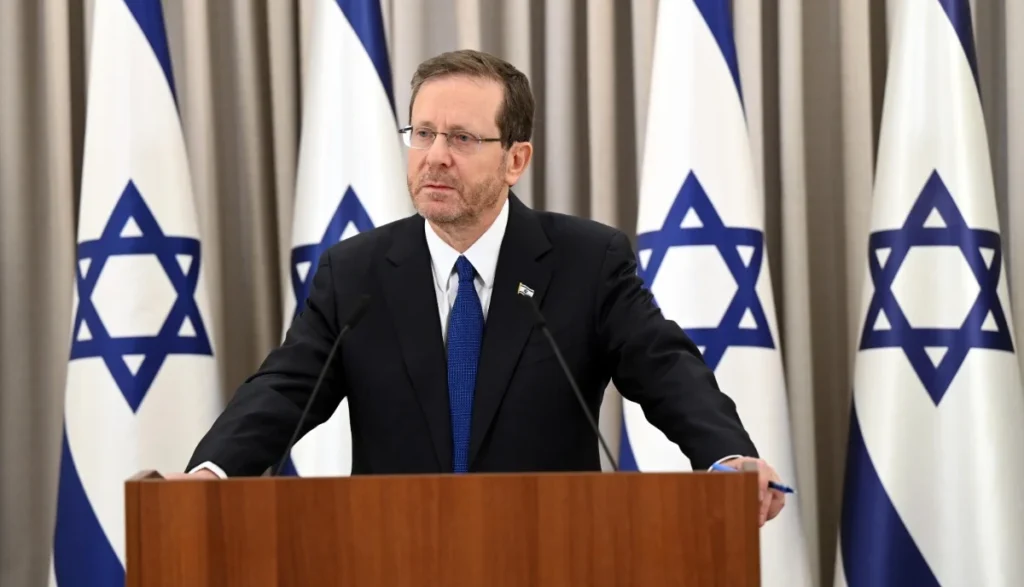UPDATES
The ‘segregated buses’ canard
March 8, 2013 | Ahron Shapiro

Like the wheels on a bus, there has been politicised spin going around regarding the launch by Israel of two new bus routes between the West Bank and central Israel designed to serve the needs of about 1,300 of the 30,000 Palestinians who work inside Israel daily.
If you were to believe the erroneous narrative that has gained traction in world media this week, however, the buses are “Palestinian-only” and represent the beginning of a segregationist policy in Israel.
It’s crucial to address this untruth from the outset: There are no public buses in Israel that Palestinians are forbidden to ride. There weren’t before the new bus routes opened and there are none now. The baseless accusation that Israel practices bus segregation is nothing more than a canard being used in service of a larger lie meant to delegitimise Israel – that lie being that the country is an apartheid state.
What’s more, in interviews, Palestinians who use the new bus routes have overwhelmingly endorsed them.
If there is no bus segregation and the bus service has been supported by the workers themselves, then the story must now shift away from the smear to the reasons behind the misinformation campaign.
How did the story about a goodwill gesture by Israel in the form of increased Palestinian employment inside Israel, combined with another goodwill gesture of improved bus service for some of these workers, become twisted into another story of Israeli “injustice” against Palestinians?
The non-story began on March 2, with a report on the new bus service in Ynet (translated from Yediot Ahronot‘s Hebrew edition) by Itamar Fleishman.
In that article, the Israeli Transport Ministry effectively countered claims by mostly left-wing parties and NGOs that there was some sort of a racial motive behind the move.
The new lines are not separate lines for Palestinians but rather two designated lines meant to improve the services offered to Palestinian workers who enter Israel through Eyal Crossing.
The new lines will replace irregular, pirate lines that charge very high prices from Palestinian passengers. The new lines will reduce congestion and will benefit Israelis and Palestinians alike.”
According to the statement, “The Transportation Ministry is forbidden from preventing any passenger from boarding any line of public transportation, nor do we know of a directive to that effect. Instating these lines was done with the knowledge and complete agreement of the Palestinians.
In an email on March 6, Aaron Sagui, the spokesman at the Israeli embassy in Washington, explained the situation another way to Jeffrey Goldberg at the Atlantic. Goldberg reprinted the relevant section of the email on his blog.
Right now, Palestinians wishing to cross legally into Israel (with a working permit) have no direct line to the border crossing. So they either take unauthorized taxis (at expensive fares, since the service is uncontrolled by transportation authorities), or they have to walk or travel to an Israeli city or village (Ariel, for instance) and there take a bus into Israel. The relevant bus company opened two lines that will serve Palestinians, going from their place of residence into Israel, saving them the trouble of going to Ariel first, or taking those taxis. The bus company made it clear, in an official announcement, that no Palestinian shall be shunned or rejected if they choose to travel on the Ariel line.
From a transportation standpoint, the new buses routes are no more “Palestinian-only” than, say, the Nativ Express line 45 that travels from the Israeli Arab city of Um el Fahm to the train station in Binyamina could be called “Arab-only” or the Kavim route 129 bus that links the Haredi town of Beitar to Bnei Brak is “ultra-Orthodox-only”. Anyone could take either bus, but the buses best serve the needs of Israeli Arabs and Haredi Jews, respectively.
The point is that Palestinian workers were not being well served by existing bus routes that service Jewish towns in the West Bank. The new lines were meant to address that problem by meeting the Palestinians at the security checkpoint with Israel and taking them to transportation hubs in central Israel, such as the train and bus transportation terminal in Tel Aviv North.
Returning to Fleishman’s Ynet article, apart from the response from the ministry, the story was inflammatory, full of innuendo that settler racism was the impetus for the route. While it had been reported that settlers had lobbied in recent months for the new bus routes to ease overcrowding and allay security concerns, there is no evidence of implicit racism behind the request.
In any case, and perhaps not surprisingly, Israel’s critics in the world media seized upon this innuendo, and downplayed or omitted entirely the simple facts of the case contained in the Ministry’s explanation, and this is how the story was presented to Australia and the world.
On March 5, leading Fairfax newspapers in Australia and New Zealand ran an edited version of a story that first appeared in the UK’s Daily Telegraph, written by Robert Tait based upon the Ynet article. (note that the online version of Tait’s story timestamped March 3 differed somewhat from the story that appeared in print in the DT‘s print on March 4.)
Fairfax omitted the second part of Yesha Council Spokesman Yisrael Medad from the Telegraph article, which had made a salient, if inelegant point: “If you were to ask some bright young [Leftist] radical, he would say forcing Arabs to ride Israeli buses would be a form of colonialism. Having their own buses should be very much welcomed as part of a state-building process.”
It’s a point worth pondering. Why should Palestinians be forced to take buses with settlers they oppose? What’s wrong with providing them with another option that, not only better serves their needs but helps them save money?
There is, of course, nothing at all wrong with it. But don’t take my word for it. Take the word of the Palestinian commuters themselves instead.
From the Washington Post‘s Joel Greenberg on March 6:
Returning from work Tuesday, several Palestinians who stepped off a special bus bringing them back to the crossing point near Qalqilya welcomed the new service, which they said cost half of what they would have paid for transport in a privately driven van.
Bassam Hanani, 38, a father of four, said the new bus routes were safer “because we avoid the settlers.”
From a story by the AP‘s Josef Federman dated March 5:
“‘Riding with settlers is humiliating… the new bus line is better…’ he said, adding that the buses were a cheaper alternative to the private minivans that shuttle Palestinians to work inside Israel.
– Haroun Hamdan, a 44-year-old blacksmith from the Palestinian village of Salem….
“[The new bus has] relieved some of the stress of the long morning journey. ‘We are comfortable being by ourselves.'”
Hosni Hanash, a 45-year-old construction worker from the village of Zeita.
From Matthew Bell on PRI’s The World radio news program on March 6:
Sitting in a window seat, a 36-year-old construction worker named Muhannad said, “this new bus is good. It’s only [USD] $1.35 each way. It beats getting ripped off by gypsy van operators.”
Muhannad said he hopes this service is here to stay. A grey-haired man named Azzem on his way to work in Tel Aviv said he agrees.
“Twenty-five shekels.” he said. “That’s what we’ve been getting charged. It’s criminal. That’s five times the cost of this bus trip by the way.” Azzem said he would like to thank the Israeli company for providing a new service for Palestinian workers. He only wishes this bus could take him all the way home to his West Bank village, instead of dropping him off outside the checkpoint.
Bell’s story, it must be added, is illustrated on PRI’s web site with a picture of a smiling Palestinian standing at a bus stop in Israel proudly showing off a leaflet advertising the new service. The photo, by Joshua Mitnick, is captioned: “Faisal Hussein lives in the West Bank and works in Israel. He’s happy about the new bus service because it saves him money.”
From Haaretz‘ Chaim Levinson, in an article titled “As Israel’s separate bus lines start rolling, some Palestinians don’t seem to mind”, March 4 (subscription required):
Khalil, a resident of Hebron, is a construction worker who is helping to build a new housing project in Petah Tikva…
On Sunday, Khalil heard on the news that there would be a new bus transporting Palestinian laborers to and from the crossing point – and he was pleased.
The bus will cost him NIS 8.80. “That’s nothing,” he says. It’s a savings of NIS 12 in each direction, NIS 250 per month. Since he earns NIS 200 per day, that’s a significant amount, he says.
The Haaretz story also spoke to a Palestinian who decided that the new routes were not as convenient for him as the existing bus routes, and he would continue using the old routes:
Samer, from a small West Bank village, goes to the Eyal crossing point every day, returns on Bus 286 from the Tel Aviv Central Bus Station to Ariel and travels on Route 5, the major highway to the settlements. He gets off the bus at the Gitti Avissar interchange, and walks to his village. From time to time, police officers would take Palestinians off the buses and send them on their way on foot.
Now there is an even greater effort to remove them from the buses – supposedly because they are not allowed to travel on Route 5 without undergoing an inspection. But the real reason is that this way they will return directly to the Eyal crossing point. Samer, for his part, said he would still try to return via Route 5 this evening, since it significantly shortens his travel time.
This excerpt helps explain reports from anti-settlement NGOs such as Machsom Watch and others of Palestinians being taken off Israeli buses at certain checkpoints. These accounts, too, are misleading, because the problem can be attributed to the current security setup in certain areas whereby processing for Palestinian entry is conducted at a specialised checkpoint in a location a distance away from where the Israeli bus crosses the security barrier.
As reported in the March 6 WaPo article referenced earlier:
Ofra Yeshua-Lyth, an activist with the group Civil Disobedience, said that on Thursday she witnessed Palestinian passengers being ordered off three buses and told to walk to a checkpoint more than a mile away.
…
Rosenfeld, the police spokesman, confirmed that there had been cases in which Palestinian laborers were told to get off the Israeli buses and pass through checkpoints processing Palestinians, but he said most were escorted to those points by police officers [i.e. given a lift].
If police are giving Palestinians rides to the alternate checkpoint, it is clear that what is being described is a logistical problem – granted, an inconvenience for Palestinian travellers on that particular route – but not discrimination.
The media frenzy over the bus story has prompted some excellent commentary by a number of bloggers and columnists, including Seth Frantzman at the Jerusalem Post, and Evelyn Gordon at Commentary, who pointed out the irony that pressure to halt the bus service can only hurt the people who are benefiting the most from the lines – Palestinian workers themselves.
The people who suffer most from the world’s knee-jerk reflex of denouncing every Israeli action are often the Palestinians themselves. But that doesn’t bother their self-proclaimed supporters; they couldn’t care less if Palestinian laborers continue to suffer from inconvenient, overpriced transportation. All that matters to them is denouncing Israel-even if it’s for the crime of providing better bus service.
Ahron Shapiro
Tags: Palestinians





